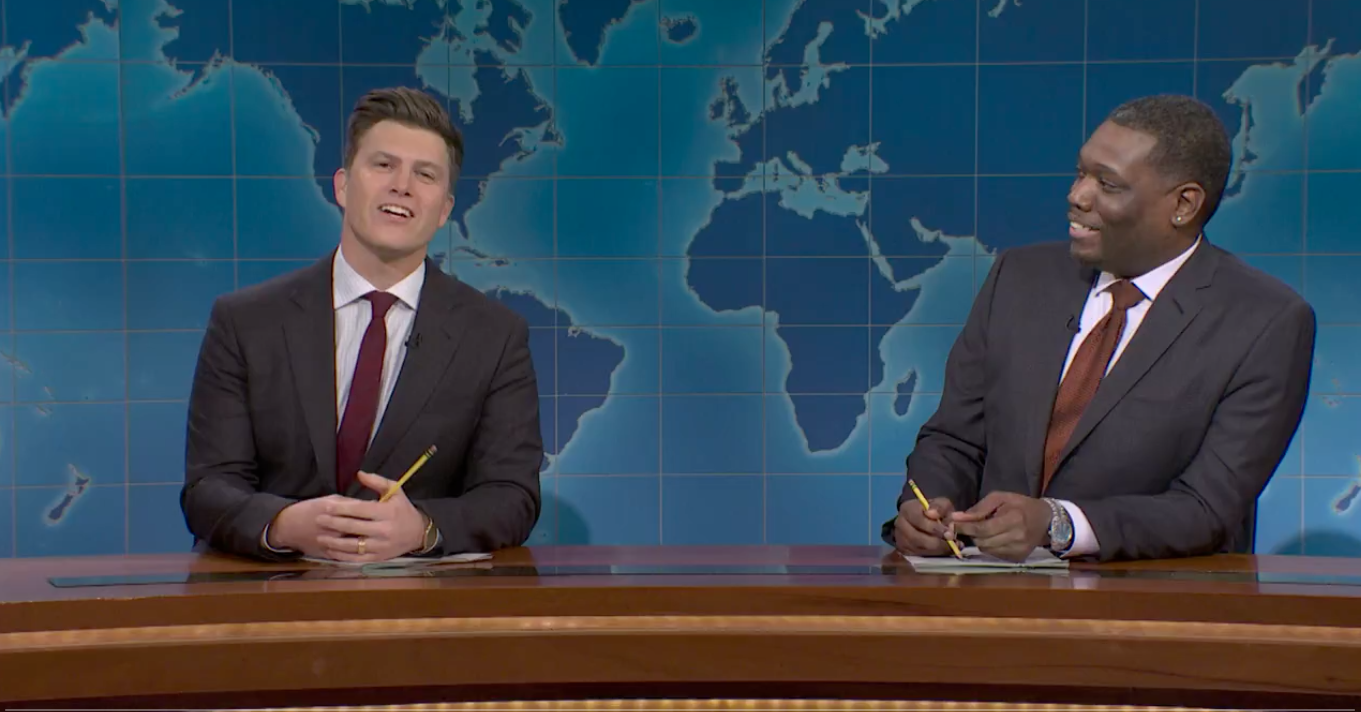MoviesNewsTalk
SNL Joke Swap: Colin Jost, Scarlett Johansson & the Art of Brutal Comedy
Saturday Night Live ( SNL ) holds a long standing position in American pop culture, as it provides, every week for a dedicated live audience a showcase for comedic writing which often blurs the lines with parody, sarcasm, commentary all wrapped up in a single hour format, which sometimes uses its more intimate relationship settings for personal gains in terms of audience appreciation. One of its best know examples about how ‘comedy pushes limits’, can be found in its well-known joke swaps for the segment "Weekend Update" where hosts ( and friends ) openly make light of personal shortcomings or, in this particular setting the relationships they engage on real life in their private time. This provides an opportunity to scrutinize the specific elements that make that unique dynamic such a fascinating exploration of modern social values. In today’s discussion we will focus precisely over that and analyze a most recent series of event, namely: Colin Jost ’s repeated jokes about his wife, Scarlett Johansson while bringing forth important elements about why this small format setting provides key aspects for this popular skit during an SNL show broadcast.
The Joke's on Who? Decoding SNL's Annual Joke Swap
The Weekend Update joke swap isn’t simply a gimmick: it is designed to intentionally showcase how comfortable these cast members are while also testing their ability to deliver ( with sincerity, genuine emotions and with a level of commitment) on material that is specifically targeting very sensitive spots. Usually these include ( but it is not limited to) controversial topics regarding race, gender identity, class warfare, and also relationship dynamics and more so that means; for someone like Colin Jost a common victim is mostly his real-life marriage to A-List Hollywood actress Scarlett Johansson .
The comedy relies not merely in ‘good joke delivery’ but specifically because that target becomes an emotional investment: viewers know these are ( presumably) real situations from an existing public relationship status and therefore it makes this specific section much more personal. This unique take on social commentary with direct and known implications pushes several key buttons from audience while also displaying that nothing ( no topic or person) is truly safe and that includes real personal interactions where someone like Colin Jost, might now have to defend or also respond towards Scarlett later that week ( if or when they go home after these shows are finished) creating meta level of comedic value for long run followers and core viewers. The writers too also showcase similar traits because of their willingness to put themselves at personal risk by actively pushing the ‘limits’ regarding accepted modern discourse as these episodes create immediate discussion, often after the broadcasts.
What becomes so crucial within this exploration has to do with context; you need not simply only focus on the joke itself to find value ( as that isn’t only objective or intent ), but to realize the greater context as well. As SNL acts like that social microcosm which amplifies core concepts where we ( all humans) exist while simultaneously questioning those values by creating that open level of personal challenge where no person should act above any form of mockery which then challenges viewers and it’s audience; by displaying an ongoing and often repeating set of ethical parameters. That approach is why this unique segment often attracts more viewership compared to other segments presented by SNL.
Colin Jost's 'Weekend Update' Jabs: A Blend of Playfulness and Provocation

In his most recent joke-swap during ‘Weekend Update’, Colin Jost had many brutal moments showcasing, if often by way of parody, how vulnerable he might seem on these specific interactions. The first choice of making racial jokes using 'Black voice' , already has an intent from his own best friend ( and a fellow weekend update presenter) Michael Che to purposefully set Colin on what some would describe as difficult situation as that relies a lot of performative skill while walking that thin line.
Following this first element, then his jabs at Scarlett; most directly all focus about an age difference with all implying a (often too blunt) lack of genuine feelings as Colin implied his own 'use of body features ‘, by having sexual implications about other people when in the privacy of his own home, ( all with an over the top and clearly performative 'distress’ over having been forced to do so by his colleagues ) , which highlights another of many underlying methods for comedic content generation as it’s almost impossible to be read from a sincere or literal approach and it seems that all those factors are very much intentional by design and they also do make their intentions much more obvious to anyone willingly taking the time for that analysis; in short none of it appears unintentional but deliberately done to generate new levels of discourse; which creates its true charm.
That ability for production ( and more so over a ‘comedy’ format production ) to acknowledge core underlying social aspects about marriage, relationships, power balances, gender representation, race differences, cultural clashes is incredibly important because that always comes through in different contexts but also under same unique shared setting from a TV show where all types of values might collide during the limited screen time.
The Larger Implications: 'SNL' and the Mirror of Society

This format does more than provide a set piece; it questions underlying societal rules in modern day existence through a 'comic' framework. When using high level profiles, famous celebrities, and long running TV personalities, SNL uses the power that those symbols represent as part of it’s narrative; therefore when something personal, ‘scandalous’, ethically challenging or any negative public light hits onto it it forces its audience to reconsider their perceptions as if we’re given that same unique space to act by the ‘powers at be' within mainstream American Television.
That idea, although presented under humor also tends to ask the same underlying question about personal views regarding accountability and ethical responsibility and with many different angles within the shows itself SNL provides an important element to both discuss those issues without directly endorsing them. As they present these sensitive situations while never truly going out from ‘acceptable norm’ with a certain type of ironic self referentiality making their own flaws a tool of content that often allows greater levels of viewerships as that ‘meta approach’ can only work because they take a big personal gamble to push very common cultural boundaries regarding ‘ what is acceptable for open mainstream conversations’. It pushes boundaries very specifically to challenge pre-established views and is the reason they often get high recognition from public and from media publications.
Conclusion: Laughing at Ourselves Through 'SNL's' Uncomfortable Truths
When exploring the dynamic found inside that ‘joke swap segment from SNL’ with a particularly closer look towards Colin Jost’s use of marriage to Scarlette for many of its ‘punchline’ its obvious, but yet critical that its underlying value resides more within ethical dilemmas than specific jokes delivery and what that means is simple; it becomes more of a reflective lens towards one’s own values and interpretations, because this shows a greater interest within core human emotions by putting the uncomfortable into full view rather than seeking a completely ‘safe and polite space’.
The use of real life celebrity relationships amplifies that core message and SNL as a weekly production makes great effort to maintain that sense of danger within their formats. What may come across as ‘ simple easy to produce content ‘ becomes a study of societal complexities that, if carefully observed provides both insights, questions and often challenging opinions but that always comes from what appears on our screens as this isn’t simply entertainment, it also mirrors several important values for people in our shared, ongoing and complex modern day reality through what might first appears to only seem to be basic weekly television entertainment.
Related Articles
- Dexter Original Sin Review: Is this Serial Killer Series Hitting the Mark?
- Y2K Movie Review: Digital Release, Streaming Info & 90s Horror Comedy
- NFL Christmas Day Games on Netflix: Mariah, Beyoncé, Mahomes, & More!
- Babygirl Movie Review: Erotic Thriller or Award Season Bait? - Nicole Kidman, Harris Dickinson, and the Christmas Film Slate
- Best Australian Albums 2023: Top Indie, New Music Releases & Aussie Music Review
- Landman Season 2: Release Date, Cast & Story Rumors - What's Next for West Texas?
- Travis Yellowstone: Exploring the Role of Travis Wheatley in Taylor Sheridan's Vision
- Richard Gadd: The Rock Fanboy? Wrestling Challenge After Golden Globes Win!
- Anya Taylor-Joy: Golden Globes Fashion & Upcoming Film 'The Gorge' | Fan Focus
- Keke Palmer in 'One Of Them Days': Free Screenings & Star-Studded Comedy